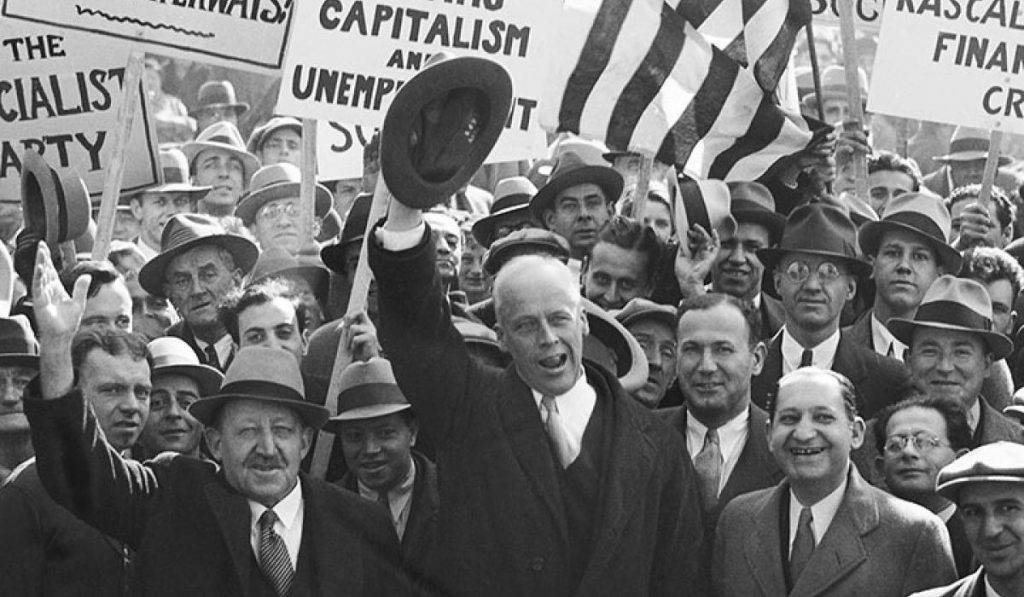Photo: Socialist Party candidate Norman Thomas 1905, speaking in Philadelphia in 1932.
This is the fourth in a series of articles about left electoral and political strategy in the United States. Before we proceed further, it is worthwhile to review the ground already covered. In the first article in the series, we argued that the Democratic Party’s collapse provides an opening for a left political force to fill. In the second article, we criticized Seth Ackerman’s proposal for a new organization as inadequate to take advantage of this opportunity. In the third article in the series, we highlighted the Bernie Sanders campaign as an example of how “progressive” challenges within the Democratic Party are bound to fail as a strategy to advance working class interests.
Hopefully at this point the reader is persuaded that abandonment of the Democratic Party must be a fundamental axiom of socialist political strategy. However, until this point we have been talking about elections, which are only one piece — and certainly not the most important piece — of the strategic puzzle.
For socialists to formulate an effective strategic orientation, we argue in this article, it is necessary to grasp what the limits of elections are — that is, the maximum gains that could possibly be won via elections. Moreover, socialists must recognize that real power is gained through extra-electoral means; elections are simply a periodic register of the underlying balance of forces. Building up proletarian power is a difficult and complicated task, and will ultimately require a working class political organization — a party — to unify, coordinate and, at times, direct struggles against the bourgeoisie.
The Limitations of Electoral Strategies
Although a social-democratic party is very far from achieving a majority government in the United States, those that advocate such a route ignore the inherent limits to using electoralism for the purpose of advancing a class agenda. In the (unlikely) event of a radical working-class party sweeping into power via election, there is little to guarantee that the bourgeoisie would be inclined to respect the result. On the contrary, the victory could be the signal for the bourgeoisie to brazenly cast aside the democratic system, since it no longer would be serving its intended purpose as a means of exercising ruling class power. The history of Allende’s government in Chile comes to mind as a paradigmatic example, but precedents go back as far as Louis Napoleon’s 1851 coup.
“Real power is gained through extra-electoral means; elections are simply a periodic register of the underlying balance of forces.
Of course, coups are not the bourgeoisie’s preferred means of thwarting working class advances, if only because they are too unpredictable. An investment strike, where capitalists stop hiring and making investments to undermine reform policies, is a preferred tactic, but most ‘socialist’ governments are all too aware of the costs of antagonizing capitalists and strive to avoid it. So the capitalists rarely have to resort to an active investment strike — but they often use aggressive financial tactics to neutralize left wing governments, for example during the recent experience of Syriza in Greece. Because the working class was not effectively mobilized in Greece and throughout the European Union, the social democrats in power could not resist capitalism internationally, and ended up as managers for the same system they were elected to dismantle.
More systematically, capitalists employ well-honed tactics of supporting political factions from center-left to far right, which counter working-class interests at the ballot box and on the streets. Certainly, one manifestation of these efforts is the Democratic Party. But in times of intensified social struggle, the bourgeoisie can be counted on to muster more illiberal forces into the class struggle. One can look to the pre-World War I German bourgeoisie’s financing of ethno-nationalist organizations in the wake of the SPD’s 1912 electoral surge as a case in point, although one can find plenty of examples in the present day. If the rightist groups called upon to combat the working class have retrograde social views — xenophobia, misogyny, racism, etc. — that is a price that the ruling class is more than willing to pay to maintain power. This threat is unfolding as we speak in the United States and throughout Europe, and creates urgent problems of defense for the oppressed.
None of this is to say that running candidates in elections is itself valueless or misguided. Indeed, we do advocate using elections, as socialists historically have, as part of a larger strategy to advance working class power. We simply counsel a realistic appraisal of the limitations of electoral mechanisms, and of the power of the ruling class. But we also urge an emphasis on extra-electoral strategies, since this is where the power of the working class truly resides.
How is Real Power Built?
Real power, for the working class, comes from organization and disruption — organization of unions and mass organization to bring the class into confrontations with the capitalists, and disruption to force the capitalists to make space for the working class organizations, if only for a time. We’ve seen how an elected anti-capitalist government without an organized working class will be overthrown by the state apparatus, undermined by right wing extremism and, in all events, discredited by its own weakness in the face of the capitalist world economy. A social democratic party that does not recognize the weakness of its position once in government is a danger to the working class, through incompetence if not betrayal.
It can be argued that voters in the US and around the world are as apt to vote against capitalists and against capitalism as at any point in the past 100 years. On the other hand, it can be well argued that the working class is at its weakest point in terms of organizational power, within that century and even longer. How did a willingness to be radical in national politics become so separate from the ability to act radically anywhere except at the ballot box?
Without organizational independence, including in elections, the left will be suffocated by the capitalists in a smothering embrace.
On many occasions it has been suggested that bringing together the unions into a broad-based Labor Party is a good way to get an independent working class party, but unfortunately this kind of effort almost always gives control to the more conservative part of the labor bureaucracy. The continuing problem with the Labor Party idea, since the Second World War, is that it is inconceivable that the highly-paid officers of labor unions would be at all supportive of a break with the Democratic establishment, let alone the party. The labor unions’ bureaucratic chieftains have spent decades undermining the self-organization of the working class to maintain cooperation with the Democrats and capitalists; not to expect further sabotage (so long as they remain in office) would be criminally naive. Really, union bureaucrats can be expected to fight against a socialist or labor party quite openly. It would be nice to think that these powerful organizations could come to our side if given the right avenue, but that ignores the political problems that put the labor movement in its present desperate situation. Before the unions will ever support a socialist party, as they should, we will have to overthrow the existing bureaucracy and put in place working members with socialist politics. And this indicates for us a more comprehensive working class strategy than just a new way of contesting elections, but ultimately more powerful.
Winning socialism entails much more than persuading voters to hate capitalism; it requires building up the power of a class that can actually defeat the capitalists. Capitalists never stop attacking workers’ organizations and unions, even when these agree to support capitalist parties, as the labor bureaucrats have done for the Democrats. Capitalist unity is ensured not just by their control of the government and two parties, but by the financial and labor markets.
For workers, on the other hand, unity is the exception. A strike directly harms one capitalist firm, but strikes now routinely fail in isolation. A wave of strikes places many capitalists in jeopardy and gives other workers confidence, and a mass political strike across an entire city or country gives cover for many local strikes to succeed on economic grounds, and reinforce thereby workers’ organization. Capitalists are so strong that often we see very little progress until a sudden breakthrough, but a political vision is needed to take advantage of those opportunities.
Socialists have been fighting capitalists long enough, by now, to learn that the working class makes substantial gains when strong militant organization down to the level of the workplace has been united with political opposition to the capitalists as a class. The two develop together. That is one reason we need a party — it is a big risk to go on strike, or join a demonstration that could lead to arrest, and most people will not do it unless they see that it has a chance of victory. And for that chance of victory to be believable, we need an organization to guard against political concessions as well as personal corruption, to find out what works and to correct itself when tactics fail, and to overcome prejudices and nationalism among the workers, which is to say a socialist party.
The Price of a Compromise Position on Elections
Elections should, we submit, be only a small part of socialist strategy. The main focus of a socialist group should be on extra-electoral matters, of which elections are merely a barometer. Taking the opposite tack is ill-advised because socialist candidates can not meaningfully influence the behavior of a capitalist state through parliament. (In many areas, such as the United States, the prospect of a socialist victory in the legislature is also unlikely at the current moment.) Moreover, participation in the election campaign of candidate from a bourgeois party — as Ackerman and the Democratic Socialists of America sometimes urge — saps valuable resources from a socialist organization and, in the worst case, can lead to an effective lobotomy or even dissolution of the group.
There exist historical precedents that serve as warnings to those who would advocate electoral collaboration with a bourgeois party. Two examples come to mind: the Communist Party USA in the thirties and the New Communist Movement in the eighties. Both entered into a coalition with a certain faction of the Democratic Party — FDR in the former and Jesse Jackson in the latter — and neither recovered the organizational independence nor vitality that they once displayed. In agreeing to a multi-class alliance with the bourgeoisie, these leftist formations found themselves inevitably dominated by the capitalists. There is no reason to believe an attempt at a multi-class grouping today would yield a different result.
Those on the left who, contrary to our position, advocate devoting socialist resources to bourgeois electoral campaigns often contrast the so-called “purity” of positions such as ours to the necessity of a hard-nosed realism of working within the bourgeois apparatus in a time of left weakness. However, the framing of this debate as purity versus realism is miscast. The true terms of debate are survival of independent socialist organizations on the one hand and, on the other, being drawn into a black hole of bureaucratism — most likely, inside the Democratic Party and its affiliates — from which the left will never escape. Only in the former does the left have any chance of growing or, indeed, exercising any discernible influence at all. How can compromise with the working class’ enemies sincerely be called realism? It smells more like surrender.
Thus, the correct position on elections, however small elections might feature in a socialist strategy, is essential. Without organizational independence, including in elections, the left will be suffocated by the capitalists in a smothering embrace. If we belabor this point, it is only because many on the left seem all too eager to repeat the mistakes of the past.










